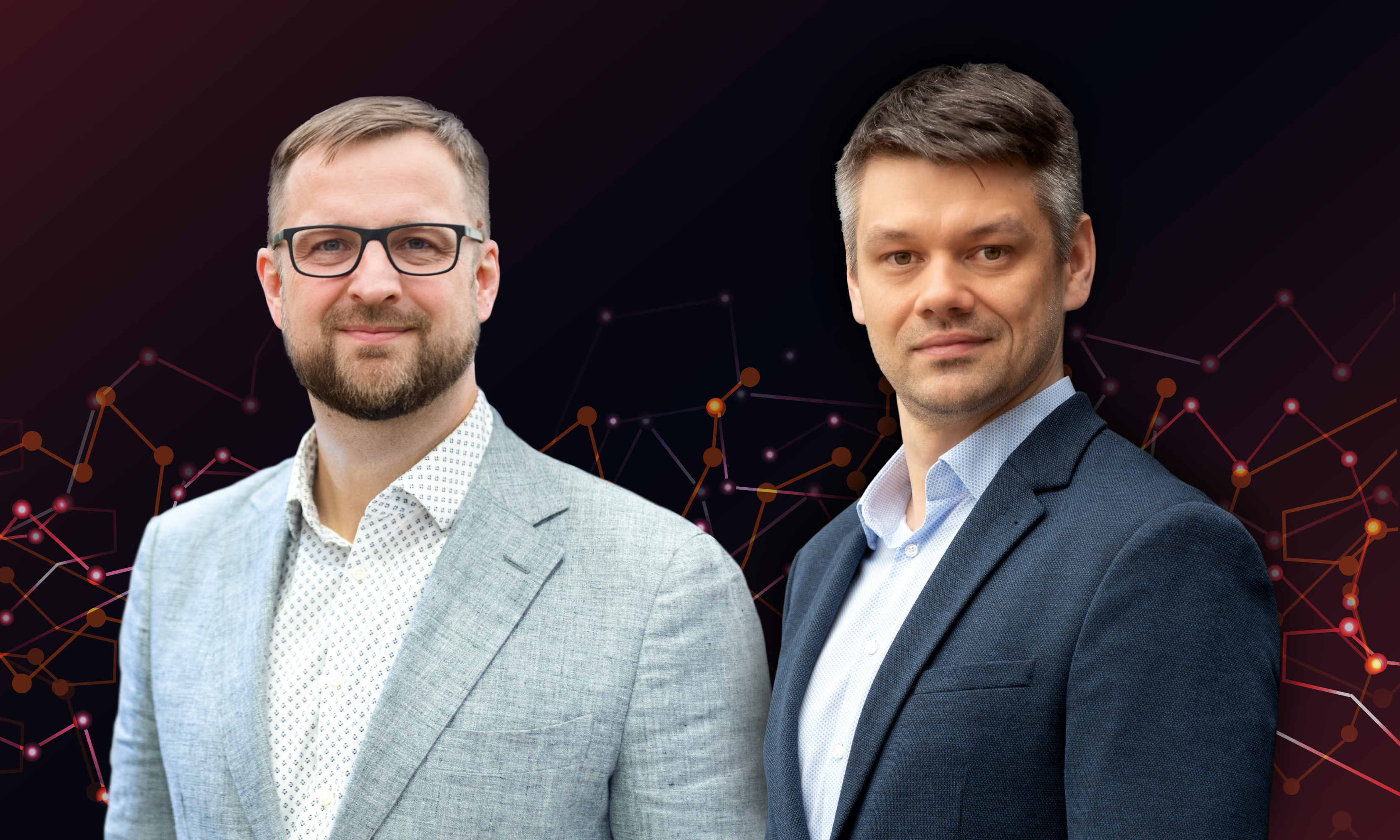Why is AI advancing slowly in the banking sector? A conversation between Tilde and General Financing Bank experts
Tilde October 28, 2024
According to a Business Insider study, in 2023, 80% of banks and financial institutions around the world have been using artificial intelligence (AI) in some form. You can find many similar numbers in the public domain, but what is really happening with AI in the banking sector? What restricts AI from being fully integrated? Will it ever be, and can we expect an autonomous financial system?
Giedrius Karauskas, Lithuanian head of the technology department at the language technology company Tilde, and Justinas Muleika, head of the General Financing Bank, discuss these questions in detail.
GIEDRIUS KARAUSKAS, Tilde: Reading the results of studies and expert forecasts on how AI will change the financial and banking sector can make you dizzy: personalised services, autonomous financial management, and no more human resources (smiling). How is it in reality? What is your current situation in terms of AI implementation?
JUSTINAS MULEIKA, General Financing Bank: AI is currently employed in a number of areas, such as customer identification or credit assessment. We have good examples of successful AI implementation, so this year, we are starting with an initiative: we are conducting introductory training sessions for all employees to familiarise ourselves with AI usage opportunities and discuss where we can use it and where it shouldn’t be used. The banking sector is very strictly regulated, and we have a lot of very sensitive data, so we’re still being cautious towards the use of AI and starting with general agreements on how we can leverage it. We will try to go further as time goes by because good examples of the use of AI do exist in the financial market.
GIEDRIUS: A two-month-old study by Gartner demonstrates that 67% of organisations are already creating new positions, taking the progress of generative AI into account. Moreover, the study says that 87% of these organisations already have a dedicated team working with AI. I’d like to ask you about the situation in your company: are the requirements for the new employees changing, or do you require the employees to be able to work with AI tools?
JUSTINAS: Currently, no, because we still do not have a company-wide practical application of AI. The requirements for new employees remain unchanged so far, but the general expectation that staff should have a high level of digital competence is growing. For example, I’m a mathematician, and maths used to be the key competency required for working in my field. Today, the key qualifications are coding and machine learning.

GIEDRIUS: There are ideas in the public sphere that in the future, we will have an autonomous financial management system driven by AI, in which financial decisions (investments, savings, payments) will be automatically managed by AI without any human intervention. Moreover, I have recently spoken to a scientist working on the Tilde team, and we came to the conclusion that AI works best and is most useful where there is no need for creativity, i.e., in activities based on strict formulations, rules, etc. This is exactly what the banking sector seems to me: for example, when deciding whether to grant a loan, you judge the customer’s solvency according to very clear formulas and rules, so it seems that AI could take over this task completely. Is that the case? Do you think that in the future we will achieve a level where a large part of the financial sector’s work will be carried out automatically and the decisions will be made by AI?
JUSTINAS: For the time being, it is difficult to imagine a completely autonomous financial system precisely because of the sensitivity of the services themselves, strict regulations, protection of personal data, etc. Yes, the banking sector is undergoing a profound transformation, you can see how smartphones have changed our entire sector, and it didn’t take a hundred years, this has been achieved merely over the last decade. I therefore believe that AI will also change the banking sector, but, in my opinion, we will not reach a fully autonomous financial system.
GIEDRIUS: Well, yes, I understand, but you mentioned that you’re already in talks about it, probing and planning to have a meeting with your colleagues to discuss the use of AI, so in theory, where do you think these technologies could do most for the banking sector?
JUSTINAS: We see where AI can speed up and improve the process of granting consumer loans, but AI cannot entirely replace human resources in our sector. Of course, we have tasks such as data entry, submission, customer identification, where we can use AI more extensively to speed up processes. There are examples of the use of AI in investment management where AI tools can select investment steps. Banks have a number of automated solutions in the consumer loan process, such as credit assessment. However, in order for the current AI tools to work and perform correct calculations, some information and parameters must be selected by a person. Having unsupervised models and the data they use increases risks. In the case of other products, such as pension funds, broader integration of AI than it is used at the moment would be problematic as such solutions are strictly standardised.
GIEDRIUS: The recently adopted new European Union (EU) directive seems to have opened up a large amount of data for the banks in order to provide even more personalised services. When discussing the future of AI in the banking sector, the experts pay particular attention to the possibility of the deep personalisation of financial services in order to provide customers with personalised percentages, limits, and transaction volumes. Do you think that in the future, AI will make it even more possible to personalise financial products for customers?
JUSTINAS: I think the truth lies somewhere in the middle because banking products are quite standardised, and there is not much room for change there. Yes, the EU has opened up the data and, in theory, combined with AI possibilities, they should open up Pandora’s box of personalisation, however, the amount of collected data is not that great, especially that which is accessible to third parties for which this regulation was meant in the first place. Therefore, only a few solutions are based on it at the moment.
GIEDRIUS: But in theory, from what datasets could it be possible to further personalise financial proposals?
JUSTINAS: Well, for example, we could easily create a credit solution based on a supermarket loyalty card because it clearly shows consumer behaviour. No one has ever done it, and perhaps, in reality, it would not be possible to obtain such data, but theoretically, it could be achieved. Today, we have very small amounts of personal data that we can collect and use, without which personalisation is impossible.

GIEDRIUS: I understand that AI without data is useless, and you are restricted not only by GDPR but also by many other regulations. The data used for the existing AI solutions is collected in some undetermined places, and we can’t control it or grant their security. But now, more and more researchers are starting to speak out about the development of smaller but niche language models, which would be lighter and could be hosted on company servers, i.e., all customer data would remain within the company. Do you think that if such technology were available, the banking sector would use AI to a greater extent?
JUSTINAS: If we had AI models internally without having to pass on personal data to third parties, I believe that, yes, the use of AI would be somewhat easier, but not as much as it is in other unrestricted sectors because we have much stricter regulation; every error we make could be costly so we don’t have much room for experimentation.
GIEDRIUS: Prevention of money laundering is a major and important activity in all financial-banking companies. Experts believe that this is one of the areas for the future use of AI. What is your opinion? If you could entrust this part of your business to reliable and proven AI solutions, would this significantly change corporate governance? At the moment, banks have huge, dedicated departments that deal with such tasks, so if AI were to take over this job, would it likely change the market significantly, not just the individual companies? How?
JUSTINAS: I believe that AI can significantly facilitate the prevention of money laundering, but it will not have the final word in each and every case for a long time. Banks would like to fully entrust this process to AI, but the error cost here is very high; AI cannot perform tasks with an accuracy of 99.5%, it must be 100% accurate because a single error can be very costly. I believe that in order to use AI in this area, you have to design the AI model yourself and know it through and through, which is often impossible in the case of AI models, and it is hard to rely on what you do not fully understand.
GIEDRIUS: Well, yes, the benefits of AI come with risks, and the banking sector is the one that has to manage the risks. So, do I understand correctly that, according to you, AI will slowly but surely come to the bank sector?
JUSTINAS: Yes, AI has already entered the banking sector and is already changing it. I believe that AI, just like all other innovations in the financial sector, will be brought by FinTech companies, and once they adopt successful solutions in their processes, others will follow suit. The things that used to be innovations a few or dozen years ago became standard in the financial market.
Due to the amount of data and processes, the financial sector is one of the largest areas of AI application. Therefore, despite higher security requirements and stricter regulation, which will have an impact on the pace of change, the changes introduced by AI will lead to both better product adaptability and the simplification of administrative processes.





